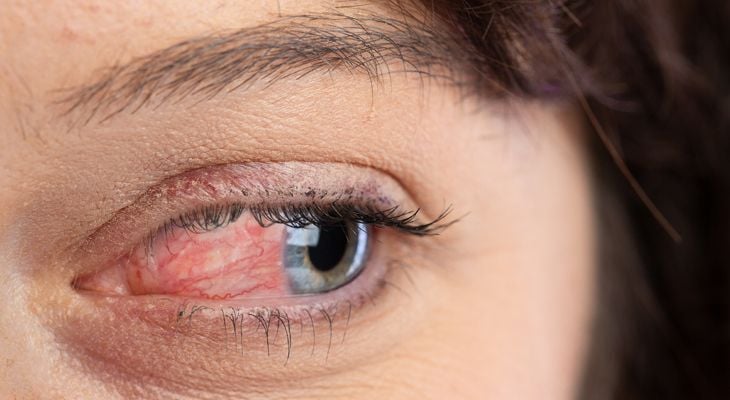
Ocular rosacea, an inflammation of the eye and/or eyelid, occurs in conjunction with rosacea of the skin. A chronic inflammatory condition, rosacea primarily affects the face, cheeks, forehead, and chest area. When rosacea affects the eyes and/or eyelids, the condition is known as ocular rosacea.
Ocular Rosacea Symptoms
Ocular rosacea primarily occurs in conjunction with rosacea of the skin, appearing either before, after, or at the same time as a skin flare up, but ocular rosacea can also develop independently. Symptoms of ocular rosacea include itchy, dry, burning, or stinging eyes; red or swollen eyelids; frequent sties; excessive tearing; eye redness (erythema); visible blood vessels on the whites of the eye; sensitivity to light; blurred vision; and the feeling of having something caught in the eye. Individuals with rosacea often do not realize they are also experiencing ocular rosacea, as eye symptoms are not always as severe as skin symptoms.
Who is at Risk?
Individuals with fair skin, a family history of rosacea, or who are prone to blushing or flushing are at a higher risk of developing rosacea. Among those who develop ocular rosacea, most are women between the ages of 30 and 60 or undergoing menopause.
When to See a Doctor
Individuals who experience any discomfort or symptoms of rosacea around their eyes or eyelids should visit an eye care professional at once. Patients who have been diagnosed with skin rosacea should visit an eye care professional periodically to rule out the possibility of ocular rosacea. If left untreated, ocular rosacea can lead to further medical complications such as blepharitis or chronic dry eyes, which can permanently damage the cornea and lead to vision loss.
Diagnosis and Treatment
An eye care professional diagnoses ocular rosacea simply by reviewing symptoms, looking over medical history, and examining the patient's eyes and eyelids. As the exact cause of ocular rosacea is not yet understood, no cure exists. The symptoms, however, can be managed with oral antibiotics and regular cleaning of eyelids with a prescription solution. Sometimes an eye care professional might recommend artificial tears.
Eye care professionals also recommend patients with ocular rosacea make a few lifestyle adjustments, as certain activities have been shown to aggravate the condition. Activities that may aggravate ocular rosacea include consuming hot or spicy foods and beverages, drinking alcohol, undergoing both physical and emotional stress, getting too much sunlight, taking drugs which dilate the blood vessels like blood pressure medication, and exposing the skin to extreme cold or hot temperatures.
